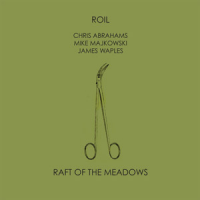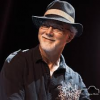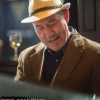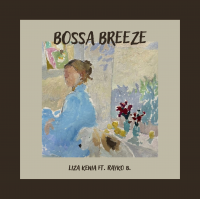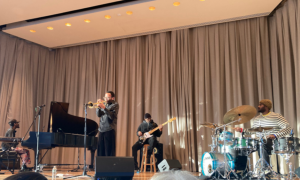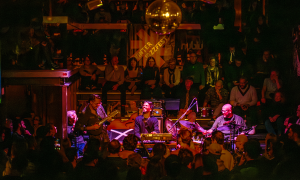Home » Jazz Articles » Live Review » Chick Corea and Herbie Hancock at Zellerbach Hall
Chick Corea and Herbie Hancock at Zellerbach Hall
Zellerbach Hall
Berkeley, CA
March 19, 2015
The two pianists needed no introduction. Taking the stage at Cal Performances, they turned to each other, old friends reuniting, and bantered about their various past visits to Berkeley, California. This was the fourth date in a tour which would culminate with four European engagements, but it was by no means their first onstage duet. The two first toured together as a duo in 1978, resulting in no less than two double albums, including An Evening With Herbie Hancock and Chick Corea (Columbia, 1978).
One of them, a trained classical musician, performed with the Chicago Symphony at age 11 before making his inimitable mark with electronic jazz funk bands. He has written a recently published autobiography, and has even been named a 2014 Professor of Poetry at Harvard. The other forged his reputation with various Brazilian and Latin-edged jazz fusion ensembles but has recently expanded to symphonic works. Both were septuagenarians, and former members of Miles Davis' various electric bands to boot.
The two pianists—also composers and personalities, were Chick Corea and Herbie Hancock. Hancock entered stage right, Corea stage left. After some initial chitchat they took to the Zellerbach stage, playing off against each other's riffs with a pastiche of chamber music-sounding duets. Their exchanges waxed lyrical at times, playful at others. At one point, Corea reached over and pounded the strings inside of the piano with his fists, creating a percussive resonance. Around ten minutes of this segued into a rendition of "All Blues," the Miles Davis classic; the tide of riffs surged in and out.
Next, Hancock stood in front of his Korg Kronos synthesizer, making adjustments to the settings. Then Corea sat down in front of his Yamaha Motif, his back to the audience. Hancock conjured Sun Ra-like tonalities from his keyboard and then Corea returned to the piano, meting out the shining crystalline crescendos of notes for which he is justly famed. After the tune's conclusion, Corea picked up his papers and tossed them aside, before getting up to face the crowd. "What a joy it is playing here," he expounded. He then went on to relate the story about the first time he witnessed Hancock in action in 1962 at New York City's famous jazz venue Birdland, while Hancock threw in asides about how he was not born yet. "I was in the womb," he asserted. "I heard him play, and I was very inspired," Hancock maintained as he hugged Corea.
Hancock then reminisced about Corea: "When I first heard [the famous Corea composition and LP] Now He Sings, Now He Sobs, I said 'Who is this guy?' Every day I was playing that record." Then Hancock related how he had once written a tune which he was convinced Corea might have actually penned, so he called him up and played it to him. He then sat down at the keyboard and played part of the composition before the duo moved on to another number incorporating dense, flowing interplay. Then, marking the end of the hour-long set, Corea stood up and announced a break.
Taking the stage again, Hancock tinkled with his synthesizer while Corea moved from synthesizer to piano and soloed, with Hancock chiming in here and there. Then Hancock returned to the piano as the duet segued into "Orbits," the classic Wayne Shorter composition. Each built off energy generated by the other.
The next tune built off a kitaro-like solo from Hancock before Corea soloed intently and methodically, with injections of synthesizer from Hancock. They then indulged in more repartee before the musical emphasis shifted back to Hancock. As "Maiden Voyage" began, Corea added percussive tones to the mix, while Hancock conjured up rivulets of sound which soon grew to rivers.
Then, the two performers stood up, and putting their arms around each other's shoulders, waved. Hancock shook hands with audience members as if he were a politician on the campaign trail, while Corea gave them a thumbs up. They then left the stage, but a standing ovation brought their return and a raucous cheer erupted. Corea began soloing on the synth, then the piano, as he conjured up waterfalls of ethereal sound. Then, as if remembering something, he halted abruptly and coached the audience on how to perform the choral parts, the soaring vocal elements which mark the Corea classic, "Spain." One side was directed to come in at one point, while the other was instructed to enter at another interval. As each sector awkwardly trained, laughter erupted. Then Hancock cut in on piano as Corea directed the choir. Corea clapped his hands before both musicians brought the piece home, with Corea continuing to solicit choral interplay. A standing ovation, with the standard kiss-blowing towards the audience followed, as the evening came to its conclusion.
Tags
Chick Corea
Live Reviews
Harry S. Pariser
United States
California
Oakland
Miles Davis
Herbie Hancock
Sun Ra
New York City
Wayne Shorter
PREVIOUS / NEXT
Support All About Jazz
 All About Jazz has been a pillar of jazz since 1995, championing it as an art form and, more importantly, supporting the musicians who make it. Our enduring commitment has made "AAJ" one of the most culturally important websites of its kind, read by hundreds of thousands of fans, musicians and industry figures every month.
All About Jazz has been a pillar of jazz since 1995, championing it as an art form and, more importantly, supporting the musicians who make it. Our enduring commitment has made "AAJ" one of the most culturally important websites of its kind, read by hundreds of thousands of fans, musicians and industry figures every month.




